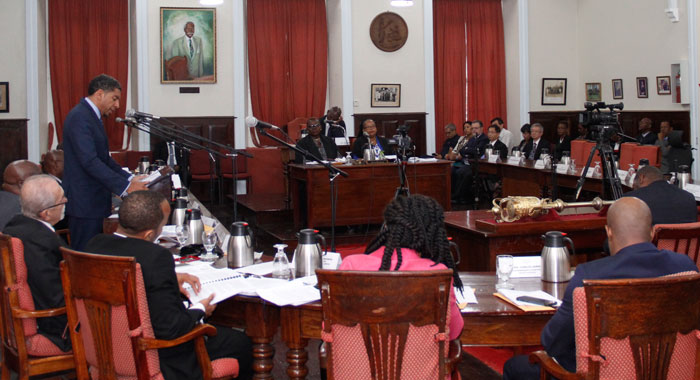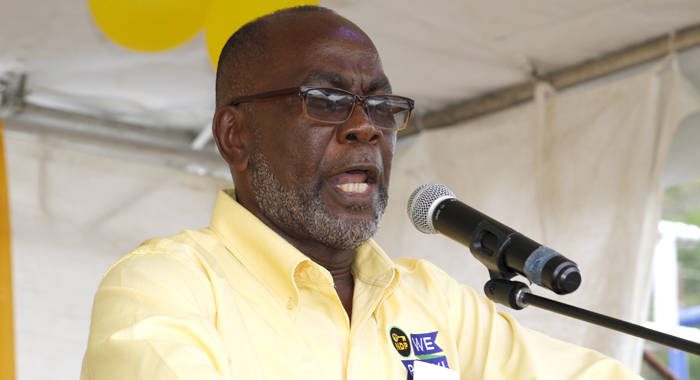Opposition lawmaker St. Clair Leacock has described the 2018 Budget approved by Parliament on Feb. 6 as confusion from the cover page onward.
Parliament approved Minister of Finance Camillo Gonsalves’ fiscal EC$993.5 million fiscal package in the absence of opposition lawmakers, who stayed way in protest against the Speaker Jomo Thomas’s handling of their no confidence motion one week earlier.
The finance minister delivered his first budget under the rubric “Continuity and Change: Job Creation, Resilience, Sustainable Development and New Opportunities in a Rapidly-Changing Global Environment.”
The fiscal package included reduction in corporate and personal income tax from 32.5 per cent to 30 per cent and raising the income tax threshold from EC$18,000 to EC$20,000 annually.
It, however, lowered from 200 to 150 kilowatt hours, the threshold at which domestic electricity consumption would attract value added tax and imposed an EC$8 nightly tax on visitors who stay in short-term accommodation such as hotels and villas.
Speaking at his New Democratic Party’s “People’s Budget” response to the official fiscal package, Leacock said that from the very sub-caption of Gonsalves’ Budget Address, “one can see the confusion in the mind of the young minister.
“I didn’t understand the continuity and change and which one he wanted, whether he wanted more of what he was coming from or what we had become accustomed to, namely, the jobless state in St. Vincent and the Grenadines — and he accepts that he has seen that in St. Vincent and the Grenadines –or whether he wanted to identify himself to be the change and to be a departure from the old experience and paradigm. So understand that to be part of his confusion,” said Leacock.
The finance minister delivered his first Budget two months after taking over that portfolio from his father, Prime Minister Ralph Gonsalves, who has held it since his Unity Labour Party came to office in 2001.
The young Gonsalves joined the administration as a senator and Minister of Foreign Affairs in August 2013, before being elected to represent East St. George in December 2015.
Leacock said that as he went through the minister’s presentation, he did not see the job creation initiatives that he was making the nation believe existed.
“Resilience. Well, thank God, we have no control over that and we know that we are in fact, in St. Vincent and the Grenadines, a resilient people. The mere fact that we are existing after 17 years of ULP administration speaks to that truism,” Leacock said.
“The sustainable development seems to be a continued pipe dream of the administration and I saw little indication of the new opportunities that he was speaking about.
“None of us will challenge the fact that we are in a rapidly changing global environment. And I might add, a changing environment that needs now, more than ever, the New Democratic Party to rescue our people from the quagmire we find ourselves in.”

‘more of the same, a balancing act’
He said that nothing in the budget speaks to the urgency for structural reforms of the economy and public administration in St. Vincent and the Grenadines that would lead to enhanced implementation of a budget that will bring real meaning to the people.
“I would say the budget is pretty much more of the same, a balancing act, balancing the books, as it were, without any due regard to whether it would give meaning to the things there.
“You might even want to add, it’s a mirage. Now you see it, now you don’t. And you are not even sure what you are seeing. It is almost like a Houdini. Pulling a hood over people’s eyes. Much ado about very little. I didn’t say nothing, because it is almost impossible for even the ULP to be in office for 17 years and not achieve something.”
Leacock said that the budget is misleading, adding that the 2011 Director of Audit report, the last year for which one is available, says on Page 11, “There are no notes to the financial statements and as such, the statements do not provide adequate information for the proper interpretation of the accounts. In addition, the narratives in the account were sometimes insufficient to determine the exact nature of the transactions.”
He said that the 2010 report was much harsher because the Director of Audit said that because of the significance of the matters described and comments mentioned otherwise in the report, “I am of the opinion that the financial statements of the government presented for audit do not in all material respects fairly represent the financial position of the government of St. Vincent and the Grenadine as at 31 December 2009 and 31 December 2010.”
‘balance by default, by non-performance’

Leacock said there is a consistency in the way the government has been presenting its business that is presenting the director of audit with problems as to the veracity of the information before her.
The Central Kingstown MP said that page 23 of the 2011 audit report says that between 2007 to 2011, budgets presented by the government are consistently falling short in spending the monies identified by the government.
In 2007, the shortfall was EC$99 million, in 2008 — EC$159 million, in 2009 — EC$105 million, in 2010 — EC$129 million, and, in 2011 — EC$151 million.
“Now, even at this stage, we can fairly well say we know in advance that for 2018, the difference would be on or around 160 million because they have been making a science of this misrepresentation and giving people the impression that the figures that are before us is what the people of St. Vincent and the grenadines are, in fact, receiving.”
He said that it is important to look back to go forward, adding that the audit report further said that in 2011, some of the major ministries spent millions less than budgeted.
The Ministry of Education spent EC$7 million less, Agriculture, EC$3 million, Health and the Environment, EC$4 million, and Tourism EC$8 million.
“It’s not the quantum of the less [shortfall] that I want to emphasise. It is the fact that the government knows in advance that the figures they state in the financial statement that they will make very little effort to expend those monies. So, the budget sometimes gets into balance by default, by non-performance. And, invariably, that non-performance is at the expense of you, the taxpayers, who do not receive the goods and services that you should be receiving.”
He said that the director of audit had noted that under recurrent budget, personal emoluments accounted for the largest expenditure, EC$197 million, followed by debt servicing of EC$121 million.
“In other words, the Director of Audit is recognising and acknowledging that if the country borrows money, there is an obligation in the given financial year to honour those debts and to pay them back.
“So that when we present the impression of surplus on the recurrent side of the budget, it is far, far away from the truth. And that’s why I explain it thus: if I sent you to a supermarket with a $5 bill to bring me back $10 worth of goods, you’d look at me and ask what’s wrong with me. You may even go on to conclude that I had to be a mad man. And this happens repeatedly.”
The 2018 Budget includes a surplus of EC$4.2 million, the first in years.
But Leacock said that in the 2018 Budget, revenue from tax and non-tax sources is projected to generate EC$619 million.
“But it has to expend EC$776 million to pay and to do all the things on the recurrent side. Obviously, very, very obviously, that can’t happen. But something must happen,” Leacock said.
Among the things that he said must happen is the payment of EC$30 million in wages and EC$60 million in pensions.
‘That alone takes up nearly 60 per cent of the budget to take care of those 6,000 public servants.”
Leacock said the government must then go on and pay EC$62 million in interest and EC$137 million on the principal on loans.
“When they do those four things, we have spent 90 per cent of the budget. Ten cents left on the dollar to run the rest of St. Vincent and the Grenadines. It explains why the police don’t respond as they should when you have a problem…, it explains why the transfers to BRAGSA [don’t] happen, it explains why the transfers to the tourism authority do not happen, it explains why our range of goods and services that you should be entitled to does not take place.”
Leacock said he hopes and trusts that a picture begins to unfold that the Vincentian people must come to grips with.






